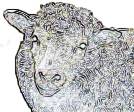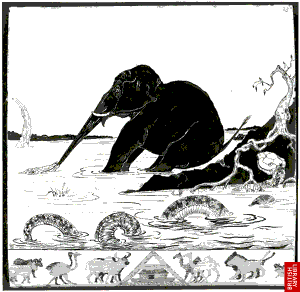Darwin was the first to propose that long necks evolved in giraffes because they enabled the animals to eat foliage beyond the reach of shorter browsers. That seemingly sensible explanation has held up for over a century, but it is probably wrong, says Robert Simmons. Simmons, a behavioral ecologist at the Ministry of Environment and Tourism in Windhoek, Namibia, believes giraffes developed long necks not to compete for food but to win mates. Simmons was studying eagles in Sabi Sand Reserve in South Africa when he happened to come upon a pair of male giraffes locked in combat. Male giraffes battle for mates by swinging their powerful necks--which can be over six feet long and weigh more than 200 pounds. The momentum generated allows them to slam their heads into their opponents with vertebrae-shattering--and occasionally lethal--force. In these contests, males with the longest, thickest necks usually prevail. As Simmons watched the fight, he became convinced that this competition for mates, not stretching for treetop food, was what drove the evolution of the neck. If competition for food had spurred the elongation, says Simmons, then you would expect giraffes to graze mainly from tall acacia trees beyond the reach of other savanna inhabitants. But giraffes feed mostly with their necks bent, along low bushes. Moreover, their short, stubby horns probably evolved to better concentrate the force of their head blows.
Storyteller: Robert Simmons. Simmons, a behavioral ecologist, Windhoek, Namibia
Source: DISCOVER 1997 How the Giraffe Got Its Neck
Story Researcher : The Evolution of the Long-Necked Giraffe — A Preview
See Also: The Evolution of the Long-Necked Giraffe
Bird Flight Automaton
2 years ago








.jpg)























6 comments:
why not just have a short muscular neck and bash heads?
Seriously... this is typical.
Another person that has no clue how evolution works.
The age-old idea that Giraffes got long necks by reaching high up, and passing them down... was not a Darwinian principle. That is lamarckianism, which pre-dates Charles Darwin and his origin of species.
Lamarckianism was proven long ago to be wrong. He was right about evolution, he was wrong about how it works.
Lamarckianism, which is what this entire thing describes, is not evolution.
Congrats on wasting your and everyone else's time by being ignorant. Read a research paper or two in your lifetime.
Lamarck states the giraffe necks are long due to stretching their necks causing the necks to become longer.
Applying the darwin theory to giraffes is that giraffes had varied neck sizes and the short necked giraffes were naturally selected against, causing only the long necked giraffed to survive and therefore reproduce. Thus, why we have giraffes with long necks
This article is arguing the mechanism drivin the selective advantage as being a mating advantage.
according to your theroy so only males wanted to attract the females so the males with longer necks prevail....ok then why the females also hav long necks...in nature no females fight for the mate....
this explanation breaks occam's razor. more likely is that the mating rituals developed as a means of natural selection related to long necks getting more food; it's the advantage of the necks in getting food that make them more advantageous.
...like the peacock, who's tail both scares off predators and acts as a mating ritual. the tail attracts mates *because* it serves a useful purpose in survival, not as a means unto itself.
Actually, I'd say mating advantage/combat is more likely than the food option, but it's possible that both were at work at the same time. There's no reason why a trait has to only be developed for one purpose, in fact it's much better if it can serve several at the same time. Besides just fighting and eating, a giraffe's long neck gets it a better view to look for predators, water, and food. All significant advantages that explain why longer necks were better than shorter necks.
All in all though, while the story suggests that our original assumption about the driving force behind giraffe evolution may have been incorrect, it does not suggest that natural selection didn't occur. In fact that is exactly what it is saying did happen.
Post a Comment